Police Ask Students to Keep Protests Peaceful Following Ferguson Decision
Boston’s top cop is asking residents to keep any planned protests peaceful in the event that a grand jury decides not to indict a police officer who shot and killed a black teenager on the streets of Ferguson, Missouri, in August.
In a message directed to “college and university” students on Thursday, Boston Police Commissioner William Evans said the entire country is anxiously awaiting the grand jury’s decision over whether charges will be brought against Officer Darren Wilson, who killed 18-year-old Michael Brown more than 100 days ago. He said that if public demonstrations occur as a result of the decision, that they are done with respect to neighbors and businesses, and conducted in a responsible and peaceful manner.
“Pending the imminent grand jury decision, if you choose to demonstrate, please do so in a way that would make your school, your family, and your city proud,” he said in a message posted to the department’s website and Facebook page.
Already, the FBI has warned of possible violent protests in major cities across the U.S. In Missouri, Governor Jay Nixon mobilized the National Guard and declared a state of emergency in preparation, a move that has led to extreme criticism from local leaders and residents. A verdict in the case is expected any day now, and should be handed down before month’s end. In Ferguson, tension has been building as the community waits.
When Brown was killed back in August, demonstrators congregated in Boston in opposition of how the case was being handled, but the gatherings remained peaceful.
Evans said the department respects the rights of individuals to assemble and advocates for their opinions and causes, but warned that “outside agitators” may jump into the crowds of people taking to the streets to try and rouse riots or disorderly activities.
Boston has been known to host large protests where activists swarm the city’s streets, crowd the steps of the State House, and hold signs outside of buildings like City Hall in times of national crisis and in support of local conflicts.
In 2012, thousands of people camped out at Dewey Square as part of the Occupy Boston movement, which lasted months and ended with a police raid at the encampment and multiple arrests. More recently, advocates have taken over municipal buildings, protested the Supreme Court’s “buffer zone” decision, and called on legislators to ban addictive prescription medicines.
“Boston has overcome much, and we have a strong history of coming together in times of challenges and crisis, as demonstrated in our community during the Boston Marathon. We showed then how Boston stayed united and we can show that again with Ferguson and all of the important issues facing us in society today,” said Evans.



